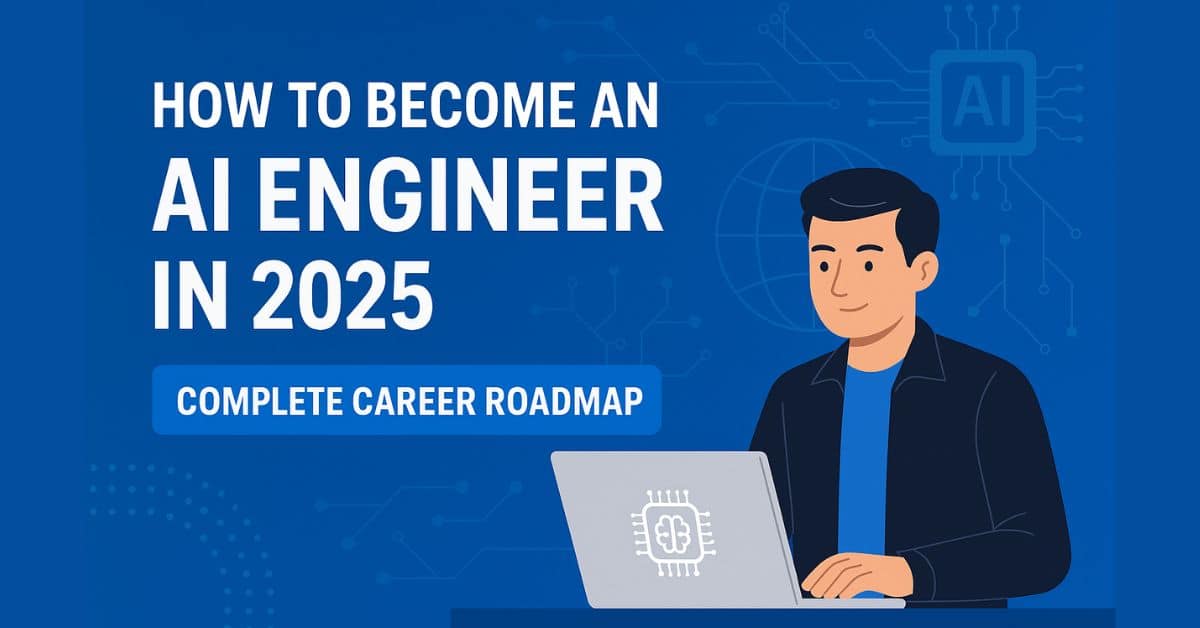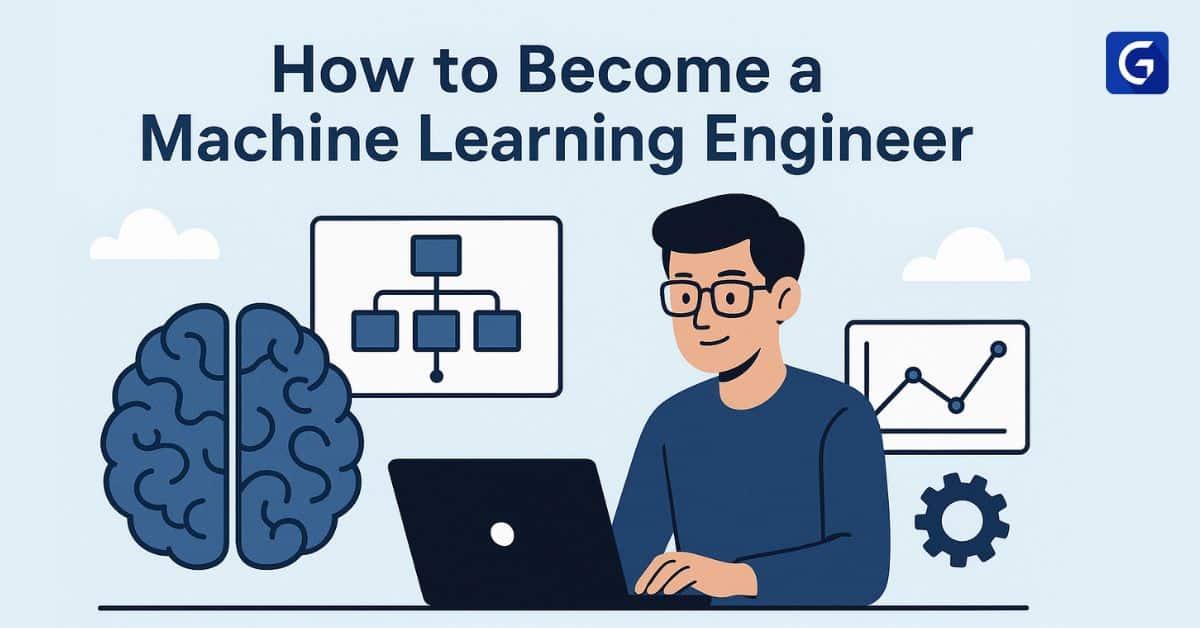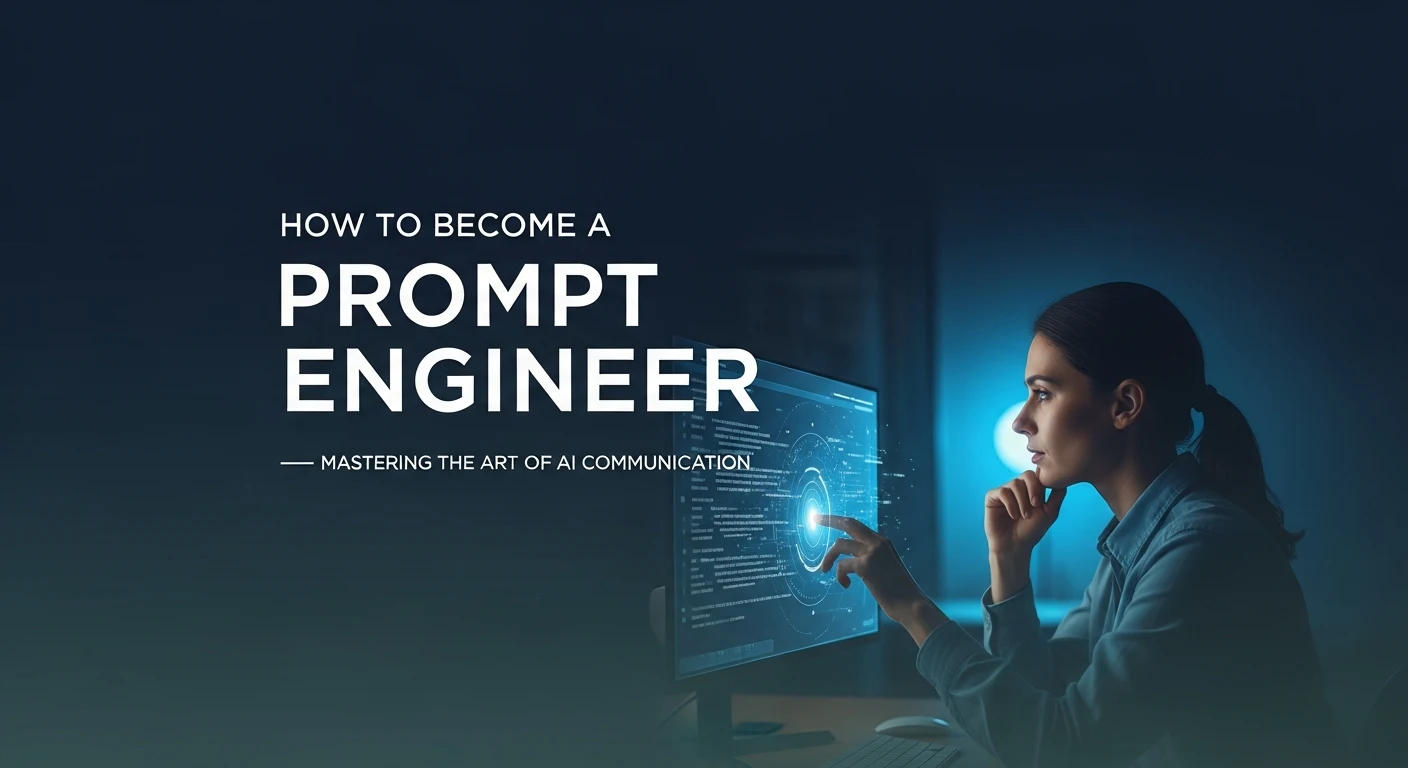Do you know? According to the report of Grand View Research, the global artificial intelligence industry is projected to reach US $1,811.75 billion by 2030, growing at a compound annual growth rate of 35.9% from 2025 to 2030.
What is AI Engineering?
AI engineering serves to create, build, and launch artificial intelligence solutions that resolve practical issues. An AI engineer develops complete AI-powered products, starting from model prototyping until final deployment at the production scale, while data scientists concentrate mainly on analysis.
An AI engineer applies their comprehensive understanding of software development, combined with machine learning expertise, as well as capabilities in data system development and cloud infrastructure.
The merging of artificial intelligence theory with practical software development forms the basis of what engineers practice as AI engineering. AI engineers must carry out two main tasks, which involve adding models to applications and designing machine learning pipelines while performing maintenance duties on deployed ML systems.
How to Become an AI Engineer: Step-by-Step Roadmap
1. Get the Right Educational Background
While a degree in computer science, electrical engineering, or mathematics is common, it's not mandatory. Many successful AI engineers come from boot-camps or self-taught backgrounds. What matters is strong foundations in logic, data structures, and algorithms.
Explore credible online programs and AI engineering course options from Great Learning to build real-world skills in artificial intelligence and machine learning.
2. Master the Mathematical Foundations
Mathematics is the backbone of AI. Focus on:
- Linear algebra (matrices, vectors)
- Probability & statistics (Bayes theorem, distributions)
- Calculus (gradients, derivatives)
- Optimization techniques (used in training models)
3. Develop Programming & ML Skills
Python is the default language of AI. Learn:
- Core Python
- Libraries: NumPy, Pandas, scikit-learn
- Deep learning frameworks: TensorFlow, Keras, PyTorch
- Supervised and unsupervised learning algorithms
4. Learn Data Engineering & Handling
No model is better than its data. Sharpen your skills in:
- SQL & NoSQL databases
- Data preprocessing and cleaning
- Big data tools (Apache Spark, Hadoop)
Explore the Master Artificial Intelligence course and gain hands-on experience in machine learning, deep learning, and neural networks. Ideal for professionals aiming to build real-world AI skills.
5. Master AI Tools and MLOps
Understanding how models move into production is key. Learn:
- Cloud platforms: AWS SageMaker, GCP Vertex AI, Azure ML
- Containerization: Docker, Kubernetes
- ML pipelines: MLflow, Kubeflow, DVC
Explore the Google Cloud Platform for Beginners course and learn the fundamentals of GCP, including its global infrastructure, core services, and the GCP Console. Ideal for beginners aiming to build foundational cloud computing skills.
Build an AI Portfolio that Gets You Hired
Practical AI projects are the fastest way to land a role. Showcase:
- End-to-end ML workflows on GitHub
- Computer vision or NLP projects using real datasets
- Participation in Kaggle competitions
Build a personal blog explaining each project, this can double as a portfolio and signal serious intent to employers.
Soft Skills & Domain Expertise
AI doesn’t exist in isolation. To stand out:
- Develop communication & stakeholder skills
- Learn about ethical AI and responsible data use
- Gain domain knowledge (finance, healthcare, logistics, etc.)
AI Engineer Roadmap: Career Growth Path
Your journey doesn’t end at landing a job. Here’s a quick AI engineer roadmap:
- Junior AI Engineer (0–2 years): Assist in model training & tuning
- AI Developer (2–4 years): Build pipelines, deploy models
- Senior AI Engineer (4+ years): Lead projects, mentor teams
- Principal AI/ML Engineer or AI Architect: Own end-to-end systems
You can also pivot into AI software engineer roles or specialize in areas like reinforcement learning or generative AI.
Salary of an Artificial Intelligence Engineer in India
The salary of an artificial intelligence engineer in India varies based on skills, domain, and experience:
AI Engineer Salary in India ranges between ₹6 Lakhs to ₹50 Lakhs for 0-6+ years of experience.
Top companies hiring AI engineers: Google, Amazon, Flipkart, TCS, Infosys, ZS Associates, and startups working on AI/ML products.
Become an AI Engineer with Great Learning
Great Learning offers expertly curated programs to help you become a job-ready artificial intelligence engineer. With hands-on labs, mentorship, and real-world capstone projects, their AI Engineer course is tailored for working professionals and aspiring engineers alike.
- The Post Graduate Program in Artificial Intelligence & Machine Learning allows you to enhance your AI engineering career through a 7-month online format.
Through their 7-month online curriculum the program offers students the essential skills of NLP and neural networks and generative AI taught by UT Austin faculty. - Advance your leadership capabilities with the Post Graduate Program in Artificial Intelligence for Leaders. Designed for business leaders, this 4-month online program by UT Austin and Great Lakes equips you with the skills to integrate AI into strategic decision-making.
Through industry sessions, mentored projects, and a capstone, you'll gain hands-on experience in applying AI across various business functions. Earn a certificate from the University of Texas at Austin and position yourself at the forefront of AI-driven leadership.
Conclusion
Becoming an AI Engineer is both ambitious and achievable. From mastering Python and machine learning to understanding cloud deployment and MLOps, your growth will come from deliberate learning and relentless building.
Take the first step today: pick a course, start a project, join a community. The future of tech belongs to AI engineers who can turn ideas into intelligent systems.
Frequently Asked Questions (FAQ’s)
1. Do I need a Master’s to become an AI Engineer?
No, but it helps. Entry into the field requires both certifications alongside a robust collection of professional work projects.
2. Which cloud platform should I start with?
The starting point for newbies should be Google Cloud and AWS because they have abundant free trial programs that suit industry requirements.
3. How do I choose my first AI project?
The first step is to select a straightforward real-world problem after which you should locate relevant data on platforms like Kaggle and implement a fundamental model before writing up the project findings.
Explore top AI projects to start with.
4. What is the difference between an AI Engineer and a Software Engineer?
AI engineers devote their attention to building machine learning models and their deployment as part of software applications. Software engineers dedicate themselves to application logic development while also designing APIs and databases with systems design yet non-inclusion of AI/ML functionality.
5. Can I become an AI Engineer without a Computer Science degree?
Absolutely. AI engineers often bring experience from physics or mathematics or statistics or unrelated fields into the profession provided they develop their ML and coding fundamentals.
6. How long does it take to become an AI Engineer?
The timeframe needed to become an AI Engineer stretches between 6 months and 2 years based on your initial knowledge level and dedication to study and project complexity. Being part of a structured training program will dramatically reduce the time needed to complete the training.
7. What programming languages should I know for AI engineering?
Python is the most important. The languages R, Java and C++ complement each other for solving specific robotics or computing tasks.
8. Is AI engineering only about coding?
Not at all. While coding is critical, AI engineers also need strong math, data handling, problem-solving, and domain understanding to build impactful AI solutions.






